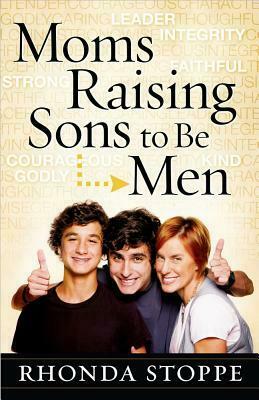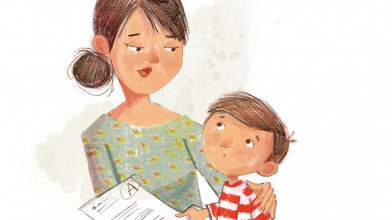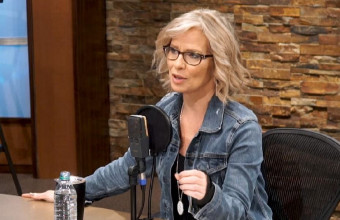John Fuller: On today’s episode of Focus on the Family, we’re going to return to a really powerful challenge for moms from Rhonda Stoppe.
Preview:
Rhonda Stoppe: God calls us to obey because it’s what he calls us to do, not because we feel it. And as I said, thank you with my lips. And as I chose to think on what was good, eventually we started noticing this amazing musician emerge out of our son, Brandon. And I would have raised an arrogant little athlete. I wanted to hear the crowd glory in my son’s accomplishments. God got me out of the way, that Helicopter Mom, the one that would have, you know, mad because the lion and the bear came, but God sent that ’cause he was molding my son’s character. And God said, “I don’t want to bring the cloud, crowd to glory in your son’s accomplishments. I’m gonna use Brandon. I’m gonna raise him up to bring the crowd to glory in my son’s accomplishments through worship.”
End of Preview
John: Well, God can use moms to influence their sons in some pretty amazing ways, and sometimes that means learning how to let go and let God have control of your precious boy’s life. We’ll hear a lot more from Rhonda today. And thanks for joining us, your host is Focus president and author Jim Daly. I’m John Fuller.
Jim Daly: John, as you mentioned, this was one of the most popular programs we’ve aired this year, and the takeaway for me was how teachable Rhonda was as a mom. You know, we hear from a lot of women who feel isolated as moms. They struggle with the daily grind of raising and feeding and caring for their children. And maybe you felt that way. But as Rhonda shared last time, she realized she needed help from other moms, older women who mentored her. And I think she called it her mommy club, which is a great name.
John: Mmm Hmm, it really is.
Jim: And we encourage you to do the same. That’s what Titus 2 is all about. Older women, likewise, are to be reverent in behavior. They are to teach what is good and so train the young women to love their husbands and children. That’s a beautiful scripture, and Rhonda’s lived that out in her motherhood journey. Of course, that same principle applies to us as men. Young husbands and dads need wise counsel from an older man to help them be the best father they can be and husband they can be.
John: That’s why we’re encouraging men to lean into this conversation as well. There’s a lot we can learn about how our wives think and feel through what Rhonda is sharing with us. Now, if you missed the program last time, we have that available online or as a CD, or you can go to our YouTube channel to see the whole thing. We also have a focus on the family app. All the details to hear or watch are at our web site, focusonthefamily.com/broadcast. We also have Rhonda’s terrific book Moms Raising Sons to be Men. Call 1-800, the letter A, and the word FAMILY to get your copy. And now here’s part two of our conversation with Rhonda Stoppe on today’s Best of 2021 Focus on the Family.
Jim: Rhonda, welcome back to Focus (laughs).
Rhonda: Thanks, it’s great to be back with you.
Jim: It’s good to have you, your energy abounds (laughs). And I love that. You… I would think you were a…
Rhonda: Did you just say I’m crazy (laughs)?
Jim: Yeah, not, not quite.
Rhonda: (Laughs). I heard crazy (laughs).
Jim: On the edge, no. But I love that. I just think what great energy you must have brought to your home with those kids.
Rhonda: My, my girls always say that “Mom’s a little bit crazy.” (Laughs). You love her, but you go a little bit crazy.” (Laughs).
Jim: I think every child should that about their mothers, but I think it’s fun. Let me ask you, and it’s very intriguing, um, to think about women of the Bible. I mean, because we’re often focused on kind of the core personalities, whether it’s the disciples, of course, Jesus, but you know, even Old Testament figures, et cetera. But we rarely don’t consider their parents and particularly their moms. Uh, what role did they play, et cetera. Um, you have so many good collections and, um, observations of mothers in the Bible. And I think one was the mother of James and John. And that’s a kind of a fun one because it’s so human.
Rhonda: Mm-hmm.
Jim: Describe what went on there, why she’s kind of outed (laughs) for being that mom, that mom.
Rhonda: The first section of Moms Raising Sons is called Moms of the Bible. And then the second is pa-, Practical Application. So, it’s written in two parts. And the reason I did that is because these are just people in their generation that God called to be the mother of the son of God, to be the mother of David, King, you know, King David’s mom. And then to be the one who raised the sons of thunder. Um, I’m thinking the sons of thunder-
Jim: (Laughs). You’re right the mom of, the moms of thunder.
Rhonda: Uh, but she didn’t have any Bric-à-brac in her house, (laughs) any knickknacks, I bet those Hummels were broken all over the place because they were the so-, sons of thunder. I mean that defines the rough and tumble, you were talking about wrestling in the basement. I think with your boys, we were talking about last hour. So, her sons leave the family business to go follow the one that they believe is the Messiah. And at some point, is it Salome, is that her name? She comes to follow and she’s there and she’s like, “Jesus, let me talk to you for a minute.”
Jim: Yeah (laughs).
Rhonda: And there’s a, there’s a family relationship there. So, she feels like she’s got the in. When you’re King, ’cause they expected Messiah to be King and sit on a throne right then and there.
Jim: Right.
Rhonda: Um, can my boys sit on either side of you? Would that be cool Jesus? (Laughs).
Jim: Sounds like a college entrance issue (laughs).
John: Ooh.
Rhonda: Ooh, too soon buddy (laughs).
Jim: Yeah, ouch, that’s cutting close (laughs). But it’s true, right?
Rhonda: But the disciples heard mama pull Jesus aside and try to pull some strings for her boys. And there’s a section in Moms Raising Sons and it’s called Mama’s Boys Get Beat Up. (Laughs). Because immediately these disciples are pretty mad and they take it out on the boys, they take it out on the sons of thunder. Like look at your mom is trying to pull some strings for you, putting your mama up to that. (Laughs). But we do that as moms, you know, my kids on the, the football team, you know, the, or the what’s it little league people, parents are crazy when their kids are playing ball, I’m going to breathe a snack bomb. I’m going to bring this; I’m going to butter up the coach. So, they play my kid. You know, we, we try to pull strings. If your kids are in school, you know, I’m going to be the, the classroom volunteer. And, and we try to manipulate people around our children.
Jim: I know we’re just enhancing their opportunity.
Rhonda: Yeah, yeah, you go with that (laughs). To make it so that my kid gets the advantage, right.
Jim: That’s what’s really happening.
Rhonda: It is.
Jim: Yeah.
Rhonda: And, and in the reality of it, we hurt our kids. We hurt our sons, we hurt our daughters when we try…
Jim: Now, in contrast you point to Hannah, who is a different type of mom, describe her and what she was good at.
Rhonda: She was good at prayer.
Jim: Huh?
Rhonda: And one of the prayers that are the most that stands out to me in scripture is the prayer of Hannah. And actually, I think of, um, uh, the prayer of Mary, as we’re talking about that, you know, she says, “My soul magnifies the Lord and my spirit rejoices in God, my savior for he who is mighty, has done great things for me. And Holy is his name.” And I know we’re talking about Hannah, but I don’t know Hannah’s prayer by heart, but I know Mary’s (laughs) I wake up and I pray that often. He who is mighty has done great things for me. If he’s called you to be a mother, whether it’s through adoption, whether it’s through foster, whether it’s through having children of your own, it is a calling, a privilege that God has called us to. Hannah couldn’t have children. And then her husband gets this great idea, “I love you, Hannah girl, but I want to get married to Penny over here. And she’s going to give me babies, but you’re still my favorite, but she’s going to make the babies.” And Hannah year after year was infertile as Pen-, Penny was having baby after baby. And she was weeping before the Lord. She took her sorrow to the Lord. In fact, she, Christ, her husband. He’s like, “Am I not good enough for you? You got me. Am I not better than, you know, however many sons.” And he didn’t get it. Poor guy. (Laughs).
Jim: Right.
Rhonda: He’s like, “No, you have kids through Penny. I’m childless.” Plus, it also made a reflection in their culture. Something’s wrong with me.
Jim: Right.
Rhonda: God’s not blessing me. And I’m speaking to some that are out there that are infertile, that are listening to this. And our hearts are with you. We need to pray for you, and we need to encourage you. And Hannah kept her eyes on the Lord. And she went and she prayed before the Lord. And when God finally did bless her with a child, she promised God, “I’m going to give him back to you.” And she brought this child to the temple. She’d come and see him every year. She’d make a little coat for him, but she gave her word that she would give this child to the Lord. And here’s the thing, she took him to a priest that wasn’t a very good guy. He had raised some rascals. He didn’t do a good job raising his own kids.
Jim: Right.
Rhonda: I’d be bargaining with God at that point, right. Okay, God, I know I promised that I was going to, but I’ll wait till-
Jim: But he’s not the guy.
Rhonda: -I’ll wait, wait till Eli dies. And then you bring in a really cool guy. I’ll take my son there. She kept her word to the Lord. And God raised up in Samuel to be one of the few prophets in scripture that has no scandal attached to his name. He just followed God. And it was her effectual po-, uh, powerful prayers that began that life that sent her son to be such an amazing man of God.
Jim: Yeah. You know, when we, when we look at, um, another aspect that you mentioned in the book, uh, the mother, son communication, there’s so much there and I observe it as the husband and father of our two teen boys and watching, uh, Jean, you know, communicate with our boys and vice versa. But, um, you, you mentioned something in the book, and I think it’s, (laughs) I don’t know if it’s a chapter title, but because I told you so, (laughs) I mean, I can hear that and my own mom even saying that.
Rhonda: Mm-hmm. Mm-hmm.
Jim: You know, just do it because I told you so, wh-, what’s a good way to motivate, and what’s a bad way to motivate.
Rhonda: We need to earn their respect from the time they’re very little so that, because I told you so can be an answer if it needs to be, and they have to …
Jim: And it works when they’re pretty young.
Rhonda: Yeah, and, and we want to establish that. (Laughs). And again, because I had mentors in my life that helped me from the time my kids were le-, young to build that respect in them. Um, but what we have to realize is there’s a section in the book, Moms Raising Sons called Train His Brain.
Jim: Yeah.
Rhonda: We had to teach them to think. Uh, my son-in-law worked at a Christian college down in Southern California. And he said, the kids that were raised in a really secure Christian home, but we’re kind of in a bubble, uh, that maybe never had the internet, never had video games, were homeschooled, all of those things left their home doing very well, but they did not know how to self-discipline. They did not know how to discern. Uh, we’re not trying to raise perfect kids. We’re trying to raise kids who know how to recover when they make a mistake or when they sin.
Jim: Yeah.
Rhonda: The normal Christian life is we sin. We as moms, I’m on the phone and my three-year-old’s listening to me as I’m talking about somebody that, you know, sister Betsy in the Cold Water Committee that didn’t like my pastor husband’s idea. I hang up and there’s my three-year-old looking at me. They just heard me sin. I gossiped. What am I going to do with that? Am I going to gloss it over or say, “Well, mommy was upset.” Or am I going to, ’cause we can cause our weaker brother to stumble by glossing it over or say, “That was sin. Mommy needs to ask Jesus to forgive me. And I’m going to ask the person I was talking to.” We have to live in a way that they see the normal Christian life as we move forward. When we sin, we repent, we pick up and we keep moving on. And training our kids’ brain, uh, I think of, uh, what Jake was saying when these kids would come to college, they would miss classes to play video games, their, their roommates’ video games. They would be on the internet, seeing things they had never learned to discern or, or guard themselves from. So, it’s learning to have them think and walk through the process, you know, as a man thinks in his heart, so is he. If, if this internet, if you’re looking at that pornography, it is going to make you into a man that I know you don’t want to be. And I know that I’ve lived long enough to know, or, you know, I’ve heard stories of this or that, that God’s gonna, Satan’s gonna take you down a path that you’re going to battle the rest of your life. I’m here to help you get away from that to be the man I know God’s calling you to be.
Jim: That’s good. Those are good, healthy connections. Um, you have a great quote in your book, Moms Raising Sons to Be Men, where you say, “The best time to neutralize conflicts with your adolescent son is a decade earlier when he’s two or three.”
Rhonda: Mm-hmm .
Jim: I mean that that’s powerful. Explain why it’s essential to teach a son about that authority as early as possible.
Rhonda: Mm-hmm.
Jim: Because I think even as a dad, I might wait. I’ll have that conversation when he’s 12-
Rhonda: Mm-hmm.
Jim: -Whatever it might be, but why start early? What’s the wisdom of that?
Rhonda: ‘Cause we become who we are from a very young age, it develops in us. And we talk about the story of Jochebed in the, in Moms Raising Sons, how she only had a window of time with that little boy before God told her, “Send him down the, the river in a basket.”
Jim: That’s Moses’s mother.
Rhonda: Moses’s mother. And you know, a lot of times with stuff going on, these people are like, “We’ve never lived in a worst time to be alive or to raise children.” I think not. This woman, they were having their children ripped from their breast and thrown into the Nile River. It’s a pretty rough time to be alive. She followed God’s plan and sent Moses out of the security of her own hands down a river, where there were crocodile and there were snakes, and she didn’t know God’s plan. She just obeyed what he told her to do. And he ended up right where God wanted him in Pharaoh’s household. And then she was able to nurse this child. If you don’t know the story, you have to read it in the Bible.
Jim: It’s a God story.
Rhonda: It’s a God story. (Laughs). But she had, you know, she nursed him maybe four years, culturally, maybe five years. We do so much in that first season of their lives to put an imprint on their mind about their, their biblical worldview. How we want to direct them to even see themselves as this creation of God. And in, in the light of that. It’s not wait until they’re 12. If, if I let my two-year-old scream in my face or say, “I hate you.” And you know, which they’re going to do whatever it takes to get what they want. If I don’t handle that, and fortunately, I had a husband that came and involved too, and he was a “You will not talk to my wife like that.” So, I was always like, “Talk about Knight in shining armor.” So, if your husband listening, your wife needs you. We’re worn out by the end of the day. In fact, by the time I had my third child, I was like, he’d come home and be like, “You’ve said no to her three times, and then you gave in.” I’m like, “I’m tired.” (Laughs). But establishing that respect so that… I always say terrible twos and adolescents, there’s really not a whole lot of difference except one has acne. Otherwise, they’re doing the same, trying to get their way, trying to get their independence. And we have to learn to establish it when they’re young. And if you’re listening and you didn’t, it’s never too late to apply biblical principles to parenting. And that’s why I wrote Moms Raising Sons to Be Men to give you the resource you’re looking for, the mentor that you had hoped you had. And I would like to say about mentors, if you’re an older mom, we need you to step up. We need you to be a mentor.
Jim: Yeah, no, that’s all good.
John: Well, our guest today on Focus on the Family with Jim Daly is Rhonda Stoppe and, uh, she is a very popular author and speaker. And she’s written this book, Moms Raising Sons to Be Men. We’re going to encourage you to stop by our website or give us a call and get your copy today, uh, while you’re at it, get a copy of this broadcast. We have other help as well for you. The starting point, focusonthefamily.com/broadcast or 800, the letter A and the word FAMILY.
Jim: Rhonda, describe the common battle moms have with teenage sons. Uh, it’s like a tug of war between the boy’s independence and mom’s perception of her little boy.
John: Yeah (laughs).
Jim: We’re looking at pictures right now. (laughs). So, we’re seeing all these, you ever done that-
John: Mm-hmm.
Jim: -I mean, you find a file on the computer that has all the kids’ pictures from like two to five.
Rhonda: Mm-hmm.
Jim: Jean and I had just been sitting there (laughs) looking at these pictures. You got to check this one out.
John: He’s such a little boy.
Jim: …so cute. You know, you remember that little boy and now, you know, now they’re independent more and more, and they’re not the same little boys that we were raising back then. So, it’s a sweet spot and good memories. But, but that tug of war and that little boy ho-, how you, how does a mom, you know, allow that independence to occur because you can go one of two directions, you smother it, or you help feed it.
Rhonda: Mm-hmm. Or the third option is you just give up.
Jim: Right.
Rhonda: A lot of times, moms are just like, “They’ll figure it out.” And off they go. And if, you know, it’s the best I can do. Uh, I think for me, uh, as Brandon and I were wrestling with him, trying to break free from me as his authority figure, uh, men crave respect. We know that. And I talk in here about how sons crave our respect. So, when I’m talking down to him as a little boy that is just raising up in him, like, why don’t you see me as a man? And I remember like, just trying to get Brandon to do the chores he’d always done. And Steve would come home, I’d be in tears. And so, one day I was just like, “I can’t do it anymore.” And he said, “I will take over, but you have to tap out and let me have this.”
Jim: And not nag Steve.
Rhonda: And, and here’s the thing…
Jim: (Laughs). Is that what you were saying.
Rhonda: Yes, yeah. And not-
John: How did you know?
Jim: You just clarify the vocabulary.
Rhonda: -And, and not rescue him.
Jim: Yes.
Rhonda: ‘Cause that’s what we, as moms do. Look, your son is blah, blah, blah. And then dad says, “You’re grounded, and you can’t go to that thing you were wanting to go to.” And then, you know, we’re like, “Oh, not, not that. Let…” And then we do it in front of the kid and we pull the kids respect right out from under dad because we defend them from the very person, they wanted us to rescue. Now we’re like (laughs), “He’s, he’s being too harsh. That’s too hard. You shouldn’t let him do that.” So when, one of the stories that I love to tell was when Brandon was doing all of these things and not doing it with the respect that I thought that I deserved, Steve said, “Okay, I’m in control, your mom. You no longer answer to your mom.” And you could tell Brandon kind of was like, “Finally, she’s nuts.” (Laughs). And he said, “But now you work for me. And I’m not an easy task master. Tomorrow, I want you to dig a ditch from our house to the wood barn.” And it was quite a distance. And, uh, the section…
Jim: It sounds like prison (laughs).
Rhonda: Yeah, yeah. Right. The section in there is called the Ditch Digger. And it’s that story.
Jim: Yes.
Rhonda: And he dug with a pick and shovel and the ground is super hard where we live. And he came in at the end of the day, wasn’t done. And he, and he had blisters on his hands, and I fully expected Brandon to be angry that he had to work so hard all day. And Steve had set up to back up he’s, in the morning when he left for work, he said, “Do not remind him if he does not do it, do not coax him to do it. So, he doesn’t get in trouble. He’ll answer to me when I get home, you are out. Do not even mention it.” Which, you know, you’re like, Oh, okay. So, when Brandon comes in the house, when Steve came home, Brandon popped up his little chest and said, “Dad, come let me show you how far I dug.” And I’m like, “Who is this kid?” Like freaked out over having to sweep the kitchen. And now he wants to show this ditch that he had dug. And then he said, “Dad, I’ve got blisters on my hands. And I have to play my guitar on Sunday for worship. Can I have some gloves? So, I can do more tomorrow?” (Laughs). Who is this kid? But you know, we as women, we know we’re going to sweep the floor today and probably tomorrow, unless we let the dog and eat the crumbs and (laughs) get by. But that’s just a menial task that we know has to be done and we’re going to do it. But what I found with Brandon is he was not energized by that task, at that adolescent age, he wanted work that he felt proud of, of something that he accomplished at the end of the day. I don’t, didn’t see that as a mom. But through Steve’s eyes, I saw what Brandon was longing for. So, as I just tapped out and let him answer to his father, I remember when Brandon was asking permission to go somewhere. I’m like, “I, I am not allowed to give you permission. Well, dad’s counseling. I can’t knock on the door.” I’m like, “I’m, I’m not allowed. I’ll get in trouble.” And that was a turning point for Brandon and me, ’cause he knew he couldn’t manipulate me to get his way to do whatever. Uh, and then I handed him his manhood, “Hey dude, can you help me lift that? It’s really heavy for me.” It, I watched him rise to the occasion. Now some are listening, going, “I don’t have a dad like that in my life. I don’t have… I’m a single mom.” And we talk about single moms in here. Or you’re a mom, but your husband just doesn’t want to be involved. You need to expose your sons to godly mentors. And I think of Lois and Eunice in scripture who raised Timothy and the Apostle Paul came along and he said, “It’s because of the influence of your mom and your grandma-
Jim: Mm-hmm.
Rhonda: -That you were ready to receive the gospel.”
Jim: Yeah.
Rhonda: When Paul delivered it to him. Paul handed the very mantle of his ministry to a son that was raised probably by a single mom at that point because his father who was not a believer had probably died is what historians believe. His mom and his grandma prepared him for the ministry that God was going to call him to. And the Apostle Paul became his Godly mentor.
Jim: And that, that’s an awesome thing. And I, I love that concept of, for a mom handing manhood to her sons. And dads got to play that role.
Rhonda: Mm-hmm .
Jim: That’s a delicate balance though, too. And you know, I think a lot of, uh, couples suffer from the busy-ness of life. And I, you know, the dad may not be engaged to look at the research right now. And it, it seems to suggest that dads may not be that engaged with their sons. What about that perspective? Where the, the marital issue is dad is not showing up and wives are struggling. And so that I guess nagging can occur where, hey, where are you? And…
Rhonda: Mm-hmm, mm-hmm. And then the resentment. I think the wife starts-
Jim: Yeah.
Rhonda: -Resenting the husband and then those digging comments or those undermining, you know, ways that we interact with our spouse. And, uh, in fact, my daughter, Kayla, she just told this story. She did a devotional at a, uh, baby shower and she was in the car waiting for her husband to come. And the three girls in the tr-, in the back seat. And when they got in the car, the little girl mentioned how long it took dad to get to the car. And he looked at Kayla (laughs) and she’s like, “They get it.” They hear even under your breath, those little things. And we can steal the respect from our husbands. So, we have to forgive them when they don’t measure up. So, we can pray for them to find godly mentors or for God to give them the wisdom and discernment to lead our families.
Jim: Well, and the, the awareness.
Rhonda: The awareness.
Jim: I mean, this could hopefully serve as an awareness for dads to wake up and engaged.
Rhonda: Wake up guys (laughs).
John: Yeah.
Jim: Rhonda, sometimes moms can feel, they have a short period of time. Maybe they’ve blown it for a long time. And now they’re, they’re down to a couple of years. Um, you make that reference. In fact, you experienced that with, uh, the son that you brought into your home, Tony. Describe that story. And then did you panic about, okay, I’ve only got a little bit of time to work with him, or how did you process that. Jean and I have done foster care, and that can be a challenge too, but when you have a young man come into your home, for whatever reason, how do you manage the short period of time that you have to influence him for a lifetime?
Rhonda: So, when Tony became a part of our family, he was 15 years old, and he related to Steve as a father right away. In fact, uh, graduation, high school graduation card, he wrote to Steve, just related his, uh, appreciation. And he’s quoted in Moms Raising Sons to Be Men saying, “I have no doubt that God caused me to be a part of this family to show me what it looked like to be a godly husband and father.”
Jim: Yeah.
Rhonda: Uh, he came to Christ when he was 15. I wanted to just jump in and mother him.
Jim: Yeah.
Rhonda: Uh, but you know, men interact shoulder to shoulder more often than eye to eye. So, I needed to find ways to speak to Tony, speak truth into his life that wasn’t just me following him around. And he had a Jeep that he would work on. We lived in Austin, Texas. It was super-hot. He’d work on it at night, out in the driveway and I’d sit in the Jeep. It didn’t have a top on it. And as his head was down in the motor, he and I would talk about girls (laughs). We talk about his dream to become a fighter pilot, which he is now, he’s a Lieutenant Colonel in the air force, flies the F-22.
Jim: Way to go.
Rhonda: Getting ready to retire.
Jim: Amazing.
Rhonda: Uh-huh. And he wanted to, he, and then we would talk about girls and then he would talk about going to A&M University. ‘Cause that was his dream. And he graduated from there. And then we talked about girls. (Laughs). And we did it all with his head in the engine.
Jim: Right.
Rhonda: If I had sat that young man down at a table in my kitchen and said, “Hey, we’re going to talk about girls.”
Jim: Right. No way.
Rhonda: He would’ve said, “Talk, I’m listening.” But he wouldn’t… Just because he was super respectful and-
Jim: Yeah.
Rhonda: -Respected Steve and Steve laid down ground rules when he moved in with our family. And that doesn’t always happen, I think when you’re taking in a foster child-
Jim: It can be difficult.
Rhonda: -Like this is the rules of the house, this is what we will do. But as I spoke into Tony’s life, I related to him as an older woman, godly mentor who loved him. But he went away to A&M University, his freshman year of college, he became, he got picked for the A&M drill team, the A team of the A&M Drill team. That’s the best of the best, if, if I can just point that out (laughs). And he came down with pneumonia and it was bad. And he called tearful that the, the nurse had said, “You need to drop out of the, the, the drill team.” And he was not gonna drop out. And he was super sick. And I asked him, I said, “Can I step in and be your mama?” And he said, “Okay.” So, I called the, the attorney who lived in Austin that kind of, uh, helped him get into A&M and, and said, “Hey, do you know this commander of the drill team? This is what’s going on.” That commander called me back and said, “I want you to know your son…” And he said some amazing, wonderful things about Tony. And he said, “We won’t drop him from the drill team. You come and get him.” I’m gonna cry. “You come and get him and take care of him. And you bring him back when he’s healthy.” And I had, we drove out to college station to pick him up, brought him back home to our house in Austin. And I took care of… He should have been in the hospital. I took care of him for two weeks, that he was in bed, completely bedridden. And that is when my relationship with Tony bonded where I, his, was his mama. Not only that I took care of him when he was sick, he gave me permission to step in and, and on his behalf when he was needing-
Jim: Yeah.
Rhonda: -Help and be a mother for him. And I, I believe that’s when Tony and I bonded, not when I forced him to listen to me, not when I, you will respect me as your mom. Sometimes God creates, we talked last, last show about God sending the lions and the bears in our kids’ lives. Uh, God sent that into Tony’s life. It, it did a work in him, but it also bonded, he and I as mother and son.
Jim: Yeah.
Rhonda: And I’m the grandmother of his two children. And he’s married to a really amazing woman that just got her doctorate in nursing. They’re precious-
Jim: Yeah.
Rhonda: Their love story is wonderful.
Jim: Well, and I so appreciate that. And I think the, the thing that I’m hearing that’s so critical is you, you did ask permission-
Rhonda: Yes.
Jim: -Can I do this? And I’m sure that spoke volumes to him to be the mom-
Rhonda: Mm-hmm.
Jim: -That you need right now. Um, well, how many biological adopted sons need to hear that? It’s everybody, everybody wants to hear that, that you care about them. And that they’re accepted for who they are, even with all their warts and wrinkles, right? (Laughs). It’s so beautiful. Rhonda, that’s a tough place to end, but what a great place to end in terms of hope and restoration and this idea of a mom’s relationship to her boys. That’s a beautiful story.
John: And that’s how we concluded our conversation with Rhonda Stoppe about her book Mom’s Raising Sons to Be Men and it is a terrific resource. We’ll encourage you to get a copy. And if you can make a donation of any amount to the ministry of Focus on the Family today, we’ll make sure to send the book to you is our way of saying thanks for joining the support team and helping Focus equip moms and dads in their parenting journey. Donate and get Rhonda’s book when you call 800, the letter A, and the word FAMILY. 800-232-6459 or stop by focusonthefamily.com/broadcast.
Jim: And let me also remind everyone here in the final weeks of 2021 that hundreds of thousands of parents will be contacting Focus on the Family in the coming year. They’ll be looking for resources for the spiritual discipleship of their children. Or maybe they’re navigating a transition in their family, like the first day of school or moving into the teen years. And some families will need help because of a significant crisis with their children. Working together, we can give these families hope and we’re counting on your ongoing financial support because you provide the fuel, we need to get this job done. We have a matching gift opportunity thanks to some generous friends, which means anything you give will be matched dollar for dollar. In other words, you’re giving will be doubled to help more parents and more children. So please be generous with your support of Focus on the Family right here at the end of the year.
John: We really do need to hear from you today, so please call 800, the letter A, and the word FAMILY or donate online at focusonthefamily.com/broadcast. Coming up next time, some better ways to manage conflict in your marriage.
Preview:
Amber Lia: We always tell people if it feels like the death of you to yield in that moment then you’re in the right place. Because it should be the death of you, it’s the death to self.
End of Preview
























